Spoilers if that's possible.
Director: Krzysztof Kieslowski
Screenplay: Krzysztof Kieslowski & Krzysztof Piesiewicz
Starring: Miroslaw Baka, Krzysztof Globisz, and Jan Tesarz
Images from the 2004 Kino Video release (from The Krzysztof Kieslowski Collection box set).
Krzysztof Kieslowski's A Short Film About Killing is an extended version of Decalogue V, perhaps the darkest and most atmospheric in the Polish television series. The Decalogue is a monumental undertaking, with 10 episodes loosely using one of the Ten Commandments as their theme. What makes the series as a whole great is that it is neither preachy nor abhorrent of the commandments but simply observes them in the context of a housing project in Warsaw. Each film, thankfully, stands on its own while still contributing to a piece that is greater than the sum of its parts. The two that stick out in my mind the most are Decalogue V ("Thou Shalt Not Kill") and Decalogue VII ("Thou Shalt Not Steal") because the films present commandments that are apparently simplistic and undermine the seeming benevolence of upholding them.
The film tells the story of three individuals. Jacek is a young man convicted of killing a cab driver. To defend him is Piotr Balicki, a young, idealistic lawyer opposed to the death penalty. The film, like much of Kieslowski's work, is not so much about the story (and "what will happen next?"), but about the characters in them. His strong sense of visual style, as well as the refusal to simplify characters creates a fascinating and haunting film pondering death, morality, and the justice system.
From the opening shots of A Short Film About Killing, we see a dead rat and then a hanged cat. Along with these images is the sound of children playing, a juxtaposition that implies a loss of innocence. The cinematography in the film is striking, creating a heavy and smokey atmosphere that has clear boundaries of light and dark. When we see Jacek, the young man who will commit murder, we often see one side of the image cast in darkness:
Here, Jacek perhaps walks on a line bordering innocence and corruption. For most of the film, Jacek is speechless, and we learn more about his character through action than words. He seems to walk on a different plane, and has a fascination with causing destruction. We may, on first viewing, see him as simply a sadistic person, borne out of a product of his age. Yet the film does not present Jacek as merely a caricature, but breathes real life into him. Moreover, the film does not explicitly dissect him, but rather leaves it up to the viewer to infer meaning through action. For instance, we see him through the glass of a photo shop:
From here, I see this as simultaneously his disconnect with the outside world, as well as a personal loss. He eventually enters the shop and asks that a creased picture of a young girl be blown up. We eventually learn this to be his sister, who died 5 years ago. Yet, even before this verbal admission, we can already infer a sense of loss. There is the scene in the café, where he is sitting and two young girls outside tease him. He flings his coffee at them with a spoon and smiles. It is the kind of smile a brother might give and it is among the more poignant moments in the film.
We can, of course, contrast this with the cab driver, who I get the feeling is a sexual predator/pedophile. It is never stated, but again, this can be inferred through action.
From the moment he says he doesn't like cats, this immediately brings to mind the dead cat in the title sequence. Perhaps he killed that cat. Then, we see him eyeing a young women no older than 20 who is Jacek's friend. Like in many Kieslowski films, fate and coincidence figure into situations while never hitting it over the head so bluntly. The cab driver also half-heartedly does his job, driving away from potential passengers when he feels like it. Finally, through mise en scéne, we see a little devil's head hanging from his car's windshield.
The final character, the one whom the film's morality hinges on, is Piotr. We first see him defending his thesis, and his belief that the death penalty is amoral. His thesis is summed up by the following quotation:
"Since Cain, no punishment has been capable of improving the world."
This is perhaps, a rare moment in The Decalogue as a whole, since it's a direct biblical reference. Here, we see Piotr talking with his advisors over a cup of tea:
We see the clear glass of water mixed with the tea, eventually becoming a uniform brown. I believe this is an image that Kieslowski has used in The Double Life of Veronique. It also mirrors scenes in Three Colors: Blue, perhaps signifying change in mentality and stature. In this particular scene, I think it suggests Piotr's changing perspectives as well as suggesting the eventual downfall of his optimism. It is in this scene that he is asked why he wants to be a lawyer, and he says that he thought he knew, but now is not so sure:
"As we grow older, the answer becomes ever more elusive."
When we are young, everything seems so clear. There are divisions between right and wrong and ambivalence is a word learned later in life. It is in A Short Film About Killing that Piotr must come to terms with his own idealism. His belief is that capital punishment is useless, and feels that he can correct it if his belief is strong. Yet, even in his moments of happiness, we see the film itself undermining this:
Here, he weaves in and out of the shadowed side of the screen. He is elated because he has become a lawyer, and believes this will allow him to make a difference. Yet we know that it will not be as simple as his beliefs tell him, because there are people with differing opinions. This often happens, I find. We get so caught up in our own opinions and get so close to them that it becomes difficult to believe we could ever be wrong.
Kieslowski's films often have an element of spirituality to them. Call it fate or coincidence if you like, what's important is that his films manage to effectively use these themes. I have said before that fate in movies tends to turn me off. I think there are two kinds, one that is fascinating, and another that is boring. First would be a kind of Fatalism, the idea that life offers certain inevitabilities and that part of what living is about is confronting, and coming to terms with them (i.e., death). The other kind would be Destiny. I can't really stand destiny. It takes all the mystery out of stories when it is declared absolute.
With A Short Film About Killing, Piotr's girlfriend reads his palms. Here, though, it makes sense. It is in this stage of his life that he is naive and idealistic. Hence, the idea of fate deals more with predicting the future than coping with inevitabilities:
It is how Kieslowski handles fate that makes it so fascinating to me. Normally, I find it annoying in films, in part because it's simple minded or lazy, but Kieslowski hits upon this, and moreover, he doesn't make claims that it is indeed a higher power. It can be interpreted a certain way, or it can be viewed as a coincidence (i.e., the ending of Three Colors: Red). By the end of this scene, in fact, we see Jacek approaching the cab driver's car, and we cut to Piotr, who has a sense of worry in his face. He says: "It may not be that easy."
Death is the common denominator. Like it or not, that is perhaps the one certainty to life, the one thing we can predict. How we will die is another matter, and the how of something in cinema is invariably what makes it interesting. I feel many people watch movies to "see what happens," and while I do to some extent, I'm really interested in how something happens. If we were only interested in seeing what happens, we'd only watch movies once (or better yet, read the synopses). Truly great films, I think, cannot be "spoiled" by spoilers because great films can be rewatched over and over.
The murder in A Short Film About Killing is a haunting scene, one filled with grimy details and the agonizing resilience of the cab driver.
In Kieslowski's films, there are inevitably minute details that give the film something special, things that make it grow in fascination. One of them during this scene is where the cab driver's dentures fall to the ground. Jacek, disgusted by this presses them into the earth, hoping to stamp them out. As his foot is lifted, we see the dentures slowly rise up, taunting him.
The shot that makes the scene so disquieting, for me, is where we cut to a bicyclist slowly riding past the murder scene while it's happening:
We also see a shot of a horse, who casually turns it's head to glance at the noise. This murder seems to stamp out the spirituality found in much of Kieslowski's work. There is no connection that is felt (completely opposite to The Double Life of Véronique, where Véronique clearly feels the spiritual link to Weronika break). This reminds me, again, of Pan's Labyrinth, where del Toro follows a man's death with nothing more than the sound of crickets. I'm reminded of Kubrick too, who said:
"The most terrifying fact about the universe is not that it is hostile but that it is indifferent; but if we can come to terms with this indifference and accept the challenges of life within the boundaries of death – however mutable man may be able to make them – our existence as a species can have genuine meaning and fulfillment. However vast the darkness, we must supply our own light."
In this sense, I don't think A Short Film About Killing is either pessimistic or optimistic, per se, but rather observant of both idealism and realism.
The color palette in the film evokes sepia tones, as if it is a distant memory, perhaps Piotr's of his first case and the moment at which his idealism was met with reality.
Again, Kieslowski manages to use another theme that I normally don't like in movies and makes it fascinating, while not making it overbearing or feel like propaganda: politics. Here, he explores capital punishment, and comes to the conclusion that in accepting the rule of eye-for-an-eye, the government is no better than the act it abhors. It is a hypocrisy. Kieslowski mirrors the first murder in the second, with every minute detail of preparation, then execution, shown intricately. The hang man's checking of the rope echoes Jacek's own rope:
Every grisly detail, down to the pan beneath the trapdoor to collect urine, is shown. It may just be my sense of humor, but there is something funny about the final execution. It is scary and atmospheric, yet the frantic desperation of the executioners actually cracked me up. Maybe it's because it so clearly shows them causing death even though they are upholding a law that punishes it. The question of whether Jacek is guilty of murder is not what the film is getting at. The question is whether the government has a right to kill as a means of punishment for murder. That is at the heart of A Short Film About Killing, which serves as a devastating look at capital punishment.


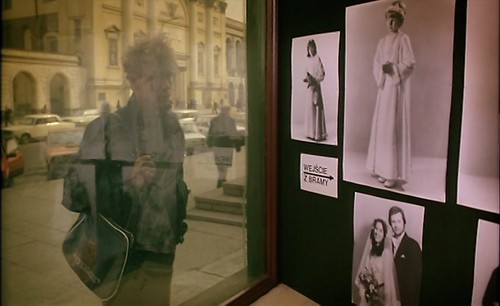


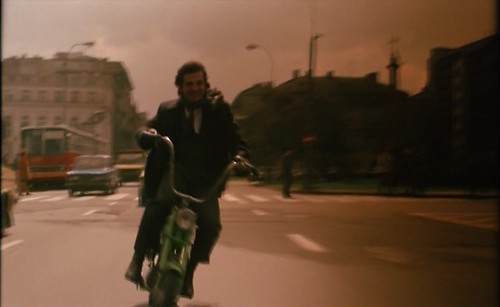
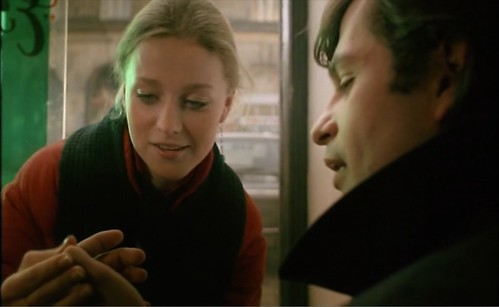

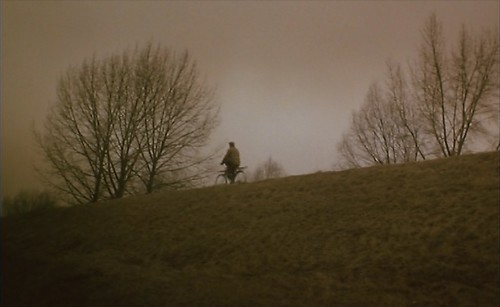

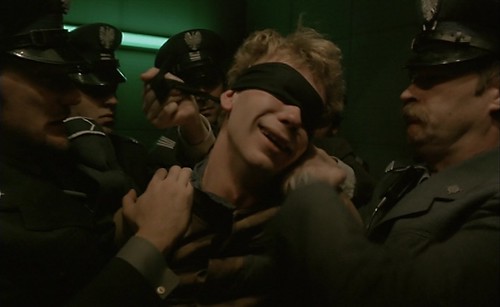
No comments:
Post a Comment